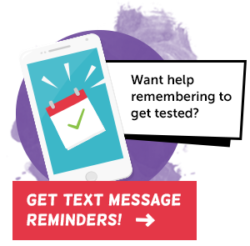Different guys have different routines when it comes to where, and how often, they get tested for HIV.
You can get an HIV test at your family doctor, a walk-in clinic, an anonymous testing site or other sexual health clinic.
It’s normal to feel nervous about getting an HIV test, especially if you’ve never done it before. If you’re worried about it, finding out you’re HIV-negative might be a relief. If it turns out you’re HIV-positive, it’s OK to be upset — but it’s also really good that you find out as early as possible so you can get connected to care right away. Getting linked to care and treatment options is the best way to support your health in the long run and to achieve an undetectable viral load.
Some guys prefer to go to anonymous testing where you aren’t required to use your name or show ID. This can be more comfortable or give guys more time to sit with their test results. Find somewhere in your area to get tested at this website or by calling the Sexual Health Infoline Ontario at 1-800-668-2437. You don’t have to have health insurance to get an HIV test at an anonymous testing site.
The best place to get tested is wherever you’re most likely to follow through with the process, and there are definitely walk-in clinics with knowledgeable, compassionate staff, but people tend to have better experiences with HIV testing at clinics dedicated to sexual health. There are also new clinics like HQ Toronto offering express testing that makes things very easy.
If you’d rather test on your own, HIV self-test kits are available. Contact your local HIV/AIDS service organization to find out how to get one in your community, or you can order them from GetAKit.ca and ReadyToKnow.ca.
Some guys find it helpful to have a regular testing routine that works for them. Talk to your doctor or counselor about the sex you’re having to figure out how often you might want to get tested. The Health Initiative for Men has also made a useful little tool for figuring out how often you should test.
In Ontario, guys are encouraged to test after every encounter where there may be a possibility of transmission of HIV (e.g. condomless anal sex). This is what we recommend in Ontario:
 Test right away if you have symptoms (e.g., rash or flu-like).
Test right away if you have symptoms (e.g., rash or flu-like).
If your test says you are negative:
 Test again at 3 weeks.
Test again at 3 weeks.
If negative:
 Test again at 6 weeks.
Test again at 6 weeks.
If negative:
 Test again at 3 months.
Test again at 3 months.
If you’re negative at 3 months then it means you are negative for sure for that incident.
For some guys who have sex that might expose them to HIV often, getting tested this frequently might not make sense. If you are possibly exposed to HIV regularly, test every three months.
If you always use condoms, it’s recommended to test every year.
It seems like a lot of testing, but it’s important to know your HIV status as soon as possible, so that you can access treatment and care early. Develop a testing routine to stay informed about your sexual health.
If you are diagnosed with HIV (or an STI) your local public health unit may follow up with you to discuss it with you. They want to make sure that anyone who may have been exposed is aware of the exposure, so they may ask you if you are comfortable contacting them yourself, or if you would like them to do that on your behalf. This is normal and is one way they try to reduce the transmission of HIV and STIs.


